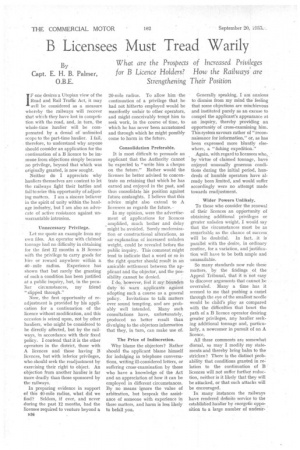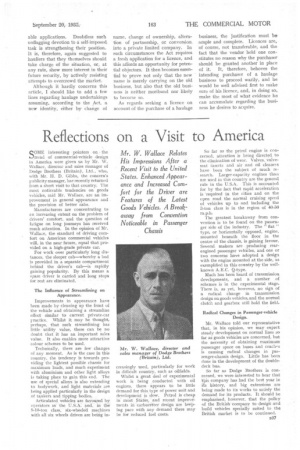B Licensees Must Tread Warily
Page 54

Page 55

If you've noticed an error in this article please click here to report it so we can fix it.
By
Capt. E. H. B. Palmer, 0.B.E.
IF one desires a Utopian view of the Road and Rail Traffic Act, it may well be considered as a measure whereby the railways will recover that which they have lost in competition with the road, and, in turn, the whole-time haulier will be compensated by a denial of . unlimited scope to the part-time haulier. I fail, therefore, to understand why anyone should consider an application for the continuation of a B licence to be immune from objections simply because
no privilege, beyond that which was originally granted, is now sought.
Neither do I appreciate why hauliers themselves are content to let the railways fight their battles and fail to seize this opportunity of adjusting matters. I am a sincere believer in the spirit of unity within the haulage industry, but I am also an advocate of active resistance against unwarrantable intrusion.
• Unnecessary Privilege.
• Let me quote an example from my own files. An operator with claimed tonnage had no difficulty in obtaining for the first 12 months a B licence with the privilege to carry goods for hire or reward anywhere within a 40 mile radius. Experience has shown that but rarely the granting of such a condition has been justified at a public inquiry, but, in the peculiar, circumstances, my friend " slipped through."
Now, the first opportunity of readjustment is provided by his application for a continuation of the licence without modification, and this occasion is seized upon, not by other hauliers, who might be considered to • be directly affected, but by the railways, in accordance with their fixed policy. I contend that it is the other operators in the district, those with A licences and those having B licences, but with inferior privileges, who should seek the readjustment by exercising their right to object. An objection from another haulier is far more deadly than those sponsored by the railways.
• In preparing evidence in support of this 40-mile radius, what, did we find? Seldom, if ever, and never during the past 12 months, had the licensee required to venture beyond a n36 20-mile radius. To allow him -the continuation of a privilege that he had nit hitherto employed would be manifestly unfair to other operators, and might conceivably tempt him to seek work, in the course of time, to which he has never been accustomed and through which he might possibly come to harm in the future.
Consolidation Preferable.
It is most difficult to persuade an applicant that the Authority cannot be expected to " write him a cheque on the future," Rather would the licensee be better advised to concentrate on retaining that which he has earned and enjoyed in the past, and thus consolidate his position against future onslaughts. I believe that this advice might also extend to A licensees as regards the future.
In my opinion, were the advertisement of applications for licences amplified, much bother and delay might be avoided. Surely modernization or constructional alterations, as air explanation of increased unladen weight, could be revealed before the public inquiry. This comment might tend to indicate that a word or so in the right quarter should result in an amicable settlement between the applicant and the objector, and the possibility cannot be denied.
I do, however, feel it my bounden duty to warn applicants against adopting such a course as a general policy. Invitations to talk matters over sound tempting, and are prob ably well intended. Many such consultations have, unfortunately,
produced DO better result than divulging to the objectors information that they, in turn, can make use of.
The Price of Indiscretion.
Why blame the objectors? Rather should the applicant blame himself for indulging in telephone conversations, writing ill-considered letters, or suffering cross-examination by those who have a knowledge of the Act and an appreciation of how it can be employed in different circumstances. By no means ignore the value of arbitration, but bespeak the assistance of someone with experience in these matters, and harm is less likely to befall you. Generally speaking, I am anxious to dismiss from my mind the feeling that some objections are mischievous and instituted purely as an excuse to compel the applicant's appearance at an inquiry, thereby providing an opportunity of cross-examining him. This system savours rather of "reconnaissance for information," or, as has been expressed more bluntly elsewhere, a "fishing expedition."
Again, with regard to licensees who, by virtue of claimed tonnage, have enjoyed unusually generous conditions during the initial period, hundreds of humble operators have already been limited, and would suffer accordingly were no attempt made towards readjustment.
Wider Powers Unlikely.
To those who consider the renewal of their licences an opPortunity of obtaining additional privileges or greater unladen weight, I would say that the circumstances most be as remarkable as the chance of success, will be doubtful. In fact, it is parallel with the desire, in ordinary routine, for a variation, and justification will have to be both ample and unassailable.
So many standards now rule these matters, by the findings of the Appeal Tribunal, that it is not easy to discover arguments that cannot be overruled. Many a time has it seemed to me that pushing a camel through the eye of the smallest needle' would be child's play as compared with the difficulties that beset the path of a B licence operator desiring greater privileges, any haulier seeking additional tonnage and, particularly, a newcomer in pursuit of an A licence.
All these comments are somewhat dismal, so may I modify my statements and thereby bring balm to the stricken? There is the distinct probability that conditions granted in relation to the continuation of B licentes will not suffer further reduction, neither is it likely that they will be attacked, or that such attacks will be encouraged.
In many instances the railways have rendered definite service to the established haulier by energetic opposition to a large number of undesir able applications. Doubtless such unflagging devotion to a: self-imposed task is strengthening their position. It is, therefore, again suggested to hauliers that they themselves should take charge of the situation, or, at any rate, show more interest in their future security, by actively resisting attempts to overcrowd the market.
Although it hardly concerns this article, I should like to add a few lines regarding haulage undertakings assuming, according to the Act, a new identity, either by change of name, change of ownership, alteration of partnership, or conversion into a private limited company. In such circumstances the Act requires a fresh application for a licence, and this affords an opportunity for potential objectors. It then becomes essential to prove not only that the new name is merely carrying on the old business, but also that the old business is neither moribund nor likely to become so.
As regards seeking a licence on account of the purchase of a haulage
business, the justification must be ample and complete. Licences are, of course, not transferable, and the fact that the vendor held one constitutes no reason why the purchaser should be granted another in place of it. It, therefore, behoves the intending purchaser of a haulage business to proceed warily, and he would he well advised first to make sure of his licence, and, in doing so, make the most of what evidence he can accumulate regarding the business he desires to acquire.




































































































